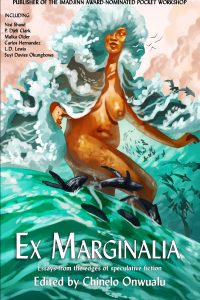Jake Casella Brookins Reviews The West Passage by Jared Pechaček
 The West Passage, Jared Pechaček (Tordotcom 978-1-25088-483-1, 384pp, $28.99, hc) July 2024. Cover by Jared Pechaček.
The West Passage, Jared Pechaček (Tordotcom 978-1-25088-483-1, 384pp, $28.99, hc) July 2024. Cover by Jared Pechaček.
I went into Jared Pechaček’s debut novel, The West Passage, with absolutely no idea what I was getting into beyond a cool cover. Pechaček’s been a delightful person to follow on various social media for some time now – sharing illustrations and fashion commentary, and one of the hosts of the lovely Tolkeinalia podcast By-the-Bywater – and so seeing his name on a fantasy novel immediately caught my eye. Friends, do not miss this: The West Passage is one of the most original and enjoyable fantasies I’ve encountered in ages.
Set in a city-sized palace complex dominated by color-coded towers and their titanic rulers, The West Passage follows two young and comparatively diminutive characters: Pell, one of the ‘‘women in grey’’ who tend to births and deaths, and Kew, the apprentice to ‘‘the guardian,’’ trained in vigilance against a world-destroying Beast that slumbers below. The novel opens with the guardian passing away, and Pell soon being promoted and renamed as Yarrow, head of her order. As unseasonal climate and a rumbling Beast threaten their world, Yarrow and Kew set off on separate journeys through the palace, encountering strange allies and monstrous forces along the way.
The world of this book is an astonishing delight; each section is new and surprising, but there’s a depth and a completeness to surroundings that is spellbinding. Giant architectural whimsy, here falling into ruin, there still bustling with activity, elsewhere echoing with ancient secrets and magic: It’s a perpetually engaging romp. Peake’s Gormenghast is an obvious point of comparison, though The West Passage stands on its own, with its own set of lively details; the living creatures and characters throughout often seem to have sprung right out of a Bosch painting – if you’re familiar with Olivia M. Swarthout’s Weird Medieval Guys, you’ll have a sense of the vibe here. Many characters have animal features; there are odd and fantastic amalgams (a ‘‘little fish-drawn cart’’ is my personal favorite) and strange magics and technologies; there’s a wonderful and surprisingly poignant section towards the end of the story where a number of giant frogs recite poetry. Pechaček communicates issues of identity and gender with some subtle and effective stylistic play, and his illustrations appear every few pages. Besides just being a delightful addition, they give the text the feeling of one of the illustrated manuscripts that occur within the story.
I don’t want to give the sense that this is a frivolous book, though – there’s whimsy, but it’s potent whimsy, with strong dashes of horror. (Think of the deadly seriousness that accompanies the playfulness in Lewis Carroll’s work, and you’ll have an idea how this works.) The Ladies that rule over this land are inhumanly large, strange featured, multilimbed: there’s a bit of an echo of the Diamonds from Rebecca Sugar’s Steven Universe in the Ladies, leaning heavily into the ‘‘war crimes and body horror’’ angle. For a novel that in some regards is undeniably cute, there’s a surprising amount of cannibalism and gore; while it doesn’t wear its thesis on its sleeve, the novel is definitely thinking about the monstrosity of power, how it accumulates and mutates and always, always, hungers.
The West Passage is also quite brilliant structurally. Yarrow and Kew’s journeys are compellingly plotted and unpredictable, bringing them into encounters with other characters throughout the palace in a way that organically fills out the world and its history. But, interspersed all throughout the novel, we get brief asides from elsewhere in the palace, excerpts from other texts and other stories. Along with the illustrations, this gives the novel a kind of organic completeness: It feels like something that should be read to someone. Never overly showy, there’s nonetheless an understated lyrical quality to the writing here, with striking imagery and well-turned phrases. It doesn’t particularly feel like a novel for children, but there’s also a kind of timeless, all-ages feeling to the story: a serious dream.
Something that I’m increasingly coming to treasure in speculative fiction is a sense of reality to the people of the larger world, a sense that characters beyond the central cast are substantial. It’s a tricky thing to pull off without losing narrative focus, and remarkable when it comes together. Besides a feeling of realism, it gives a kind of moral heft to the world, a sense that the plot matters beyond the conventions of storytelling. Yarrow and Kew and their companions are extremely well-done, but part of what makes the novel shine for me is how Pechaček animates even incidental characters and creatures. Human even at its most fantastically inhuman, and with an ending that blends gigantic epic confrontation with quiet moments of perspective, The West Passage is a thoughtful and wildly inventive fantasy that deserves to be on all our reading lists.
Jake Casella Brookins is from the Pennsylvania Appalachians, and spent a fantastic amount of time in the woods. He studied biology, before switching over to philosophy & literature, at Mansfield University. He’s been a specialty coffee professional since 2006. He’s worn a lot of coffee hats. He worked in Upstate New York and Ontario for about 8 years. He’s been in Chicago since 2013; prior to the pandemic, he worked for Intelligentsia Coffee in the Loop. Starting in 2021, he’s been selling books at a local indie bookstore. He lives with his wife, Alison, and their dogs Tiptree & Jo, in Logan Square.
This review and more like it in the July 2024 issue of Locus.
 While you are here, please take a moment to support Locus with a one-time or recurring donation. We rely on reader donations to keep the magazine and site going, and would like to keep the site paywall free, but WE NEED YOUR FINANCIAL SUPPORT to continue quality coverage of the science fiction and fantasy field.
While you are here, please take a moment to support Locus with a one-time or recurring donation. We rely on reader donations to keep the magazine and site going, and would like to keep the site paywall free, but WE NEED YOUR FINANCIAL SUPPORT to continue quality coverage of the science fiction and fantasy field.
©Locus Magazine. Copyrighted material may not be republished without permission of LSFF.






